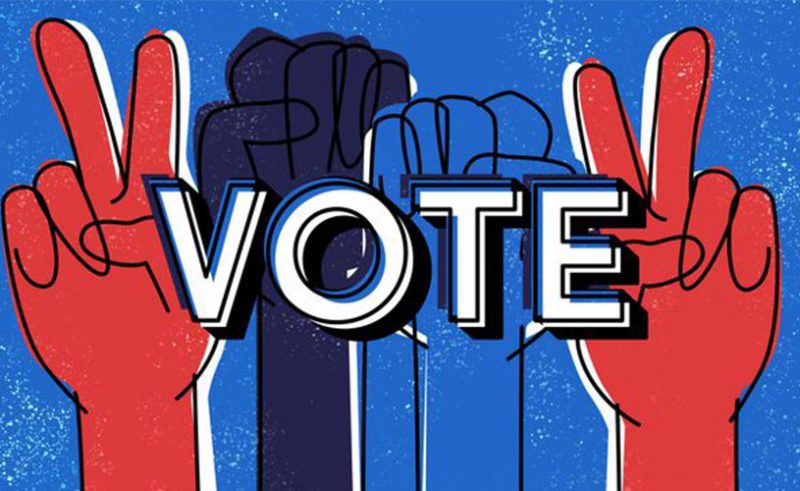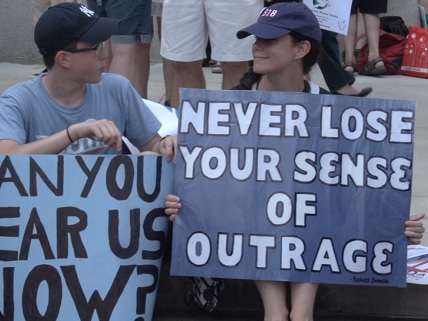It reminds me of Henry Ford's famous statement that the public could have whatever color car they wanted...so long as they wanted black except that we can have anyone we want represent us provided they represent the red or blue political slate.
Ultimately, this little nothing more than playing with semantics. Using "political speak", terms such as "free" or "democratic" can be made to mean whatever the state wants them to mean. Where does America actually rank using existing data when it comes to "freedom" and "democracy"? Living in a society which is based on the capitalist model, a free marketplace would certainly be a good place to start in defining a free Republic. So, let's get started.
According to the conservative "Heritage Foundation", the United States is ranked third out of the 32 nations comprising the Americas (North, Central, and South America). Globally, the U.S. ranks 25th in economic freedom among the 185 nations in the survey, labeling us as "mostly free" economically. Our "freedom index" is a 70.1%, down 5% from last year. The globally average is 58.6% (as an aside, with a cut off of 69%, we are on the edge of being labeled "moderately free").
Another key category tied to economic freedom is property rights. When you hear or read about America becoming "socialist" or Communist, one of the first things to pop into your mind should be property rights. The essential hallmark of both ideologies (no, they aren't one and the same) is who owns the property.
Under both systems, socialism or Communism, the state or the people own all the property. Individuals or businesses do not own property, any property, including their homes, factories, or offices. But with fascism, the private ownership of property is permitted. So, how does the U.S. rank in terms of private ownership of property?According to the survey, the U.S. ranked a very impressive 95.1% when it came to private property ownership (I suppose allowances had to be made for "eminent domain"). A perfect score is 100%. The first takeaway from this figure is that we aren't sliding into "socialism" or Communism as some snake oil group or individual would have you believe.
The fact is that it's the ruling elite who are deathly scared of both Left Wing ideologies. Why? Both would strip them of their wealth and power. no less than a democratic republic would. In the case of socialist democracy, it puts political and economic power directly into the hands of ordinary citizens. Feeling scared yet?
Our financial freedoms, which includes monetary, investment, trade, and investment freedom, have an average score of 75.6%, which is good. However, it still categorizes us as "mostly free". Our judicial effectiveness and government integrity were ranked at 74.8% and 76.4%, making us "mostly free".
Our labor freedom is ranked at 77%, which once again puts in the "mostly free" column. It needs to be pointed out the Labor freedom only applies to the ability of workers to work where they please. and to freely quit and go elsewhere. It doesn't specifically include how they're treated, unionized or "Right to Work," their wage or benefits, etc. It bears mentioning that our business freedom score ranks a significant 84.8%, meaning corporate America is doing far better that those who make it run.
Where America has performed poorly has been with government spending and managing the national debt. The U.S. is ranked a dismal 48.7% in government spending, putting it in the "repressed" category. The Institute of International Finance (IIF) ranks the United States the single worse nation in the world, bar none, in terms of national debt.
We owe over $31.4 trillion dollars to foreign creditors. That's more than the next four debtor nations (China, Japan, France, and Italy). Think of our debt like this. We are the world's top panhandler, depend on other countries to feed our spending addiction while we prop up other nations. The top four countries with the lowest national debt are Australia, Singapore, South Korea, and Mexico.Other area we did poorly in was our overall national fiscal health. We ranked at the bottom with a good ole "goose egg". That zero put us deep in the "repressed" category. That's where you'd expect to find totalitarian governments. Being on the bottom is a clear indicator that our economic and political systems aren't stable. Truthfully, it wouldn't take a great deal to collapse our house of cards.
According to the Freedom House, a think tank known to advocate on issues like human rights, expanding democracy, and political freedom, released it s highly respected "Freedom Index" survey in 2023 (it's latest to date). It showed that democracy worldwide remains in decline for the 18th year in a row.
Speaking of human rights, the United States earned a letter grade of "D" in terms of its human rights per the Global Rights Project. Numerically, the U.S. was 59th out of 183 countries. The survey comprised a overall score based on physical integrity and protection from government agencies, empowerment and the ability to speak and live freely, protection of worker rights, and fair judicial rights.
The World Justice Project placed the United States 23rd out of 142 countries when it came judicial equality. Our regional ranking was 19 out of 31. In terms of having an open government, we ranked 16th of 140 countries. In the area of basic rights, we scored 37th out of 140. When we look at overall political stability from 1999 to 2022, GlobalEconomy.com puts the U.S. 100th out of 192 countries; beneath the Congo (97th), Vietnam (98th) and Cambodia (99th) and above Montenegro (101), Guinea (102), and Ghana (103). Not what you'd expect from the "leader of the free world" is it?
In case you're wondering, Liechtenstein, Andorra, Aruba, Singapore, and New Zealand made up the top five most politically stable nations. Switzerland was 13th, Australia was 31st, Canada was 46th, China was 132nd, and Russia was 160th. That's some pretty questionable company if you ask me.
Another important factor in establishing a properly functioning democracy is education. After all, students are the future of any nation. In terms of academic achievement, the U.S. ranked 13th in the world according to the Organization for Economic Cooperation and Development (OECD). We were a distant 16th of 81 countries in science, with the top five nations all being from Asia.In math we were just as bad, coming 34th out of 81. The top five nations were all Asian---Singapore, Macao, Taipei, Hong Kong, and Japan. When it came to literacy, the U.S. ranked 36th of the 83 OECD member states. Just 79% Americans can read and write at grade level when they graduate high school. 25% of children reach adulthood unable to read. 75% of prison inmates never graduated from high school. Meanwhile, countries like Ukraine, Norway, Russia, and Finland all have 100% literacy rates.
19% of high school graduates struggle to read at grade level. 85% of juvenile offenders read below the average literacy rate. 21% of Americans read at or below a 5th grade level. 14% of adults are "functionally illiterate". 14% of Americans---about 32 million individuals---can't read. What these numbers indicate is that we're losing our competitive edge as the balance of power shifts eastward.
We have the highest poverty rate of the 26 most developed countries with some 40 million Americans living at or below the poverty line (many being veterans). If it wasn't for that old "socialist" Social Security program, as originally called, you'd be adding another 27.3 million people to that number.
When it comes to child poverty, the U.S. ranks second only to Mexico according to the United Nation's UNICEF out of the top 35 wealthiest nations. And to think that the average CEO's income is a mere 196 times that of their employees. Of course, the one upside about poverty is that the poor rarely vote.
According to the OECD, the Organization for Economic Cooperation and Development, the average turnout of registered voters for a general election is 65%. Here it's 62%. OECD members, Turkey, Belgium, and Sweden have the highest percentage of voter turnout with 78% or better. Chile, at the other end of the scale, has a turnout rate of under 51% after voting went from mandatory to volunteer.Women vote more often than men (56% vs. 53%). Whites have historically voted in higher numbers than minorities. 75% of those age 65 and over turn out to vote while half of those under 45 don't. Married people vote more often than singles. White collar employees and professionals vote more than blue collar workers by a margin of 70% to 38%. The higher the level of education, the more likely that individual is to vote. Home owners vote more often renters (63% to 38%).
Some voters show up but are turned away because they lack proper identification. Since you have to have a photo ID for practically everything, why would someone assume they wouldn't need a photo ID to vote? The Left complains that requiring proof of who you are somehow discriminates against minorities while conservatives say it's simple common sense in a era of stolen identity and voter fraud.
Perhaps the biggest reason for the low turnout is that simply voters don't care. According to Pew, over 60% of Americans are frustrated with elections and politicians. Many---39%--- no longer trust the corporate media. Congress represents Wall Street, not Main Street.
Americans know that the one with the most money usually wins (thanks to Citizens United and the corporate financing of politicians and the two parties) while other candidates---Independent and third party--- are virtually ignored, assuming they can even get on the ballot thanks to crooked electoral regulations. Partisan gerrymandering virtually guarantees the incumbent will win and with the absence of term limit, it means they're going to be there for many years to come.
Lastly, when it comes to primaries, the nation's largest voting bloc, Independents, and their third party kin, are prohibited from participating in most states (despite the fact that our taxes finance the primaries, making it quite literally the definition of taxation without representation). That in itself is a poor commentary on our election system.What does this say about our democracy? It says we are looking at some very deep cracks in our nation's foundations. Poverty growth and educational decline are affecting our ability to compete globally and straining our national safety net (and that doesn't even consider illegal immigration). The well-to-do are more likely to protect their interests compare to anyone else regardless of race, gender, orientation, or ethnic group.
Congress, as well as other branches of government are dominated by Wall Street. How else do you explain an approval rate below 30% and a reelection percentage of 98+%? They underwrite their campaigns, help write the legislation, review and make recommendations about proposed bills. The majority of Americans have all but lost interest in what's happening in Washington and state capitals out of frustration.We've come to accept theater over substance. We often hear about "woke" Americans, but unless Americans collectively wake up, what remains of our Republic will fade away and will cease to exist except for in our memories.
If you enjoyed the article, please consider passing it along
to others and don't forget to subscribe. It's free! Lastly please be sure
to "like" us on whatever platform you use to read anotheropinionblog.com. It helps beat the algorithms and keeps our
articles in circulation. Thank you!
The Heritage Foundation: Index of Economic Freedom
How does the US debt rank compared with the rest of theworld?
Why the U.S. scored a "D" for human rights in a new report
World Justice Project: Rule of Law Index
The Balance: U.S. Education Rankings Compared to OtherCountries
22+ US Literacy Statistics: Literacy Rates, Average ReadingLevels
The Best Healthcare in the World: Country Ranking
Debt.org: Poverty in the United States
:max_bytes(150000):strip_icc()/repdem-5c92359446e0fb00014a97c1.jpg)




No comments:
Post a Comment